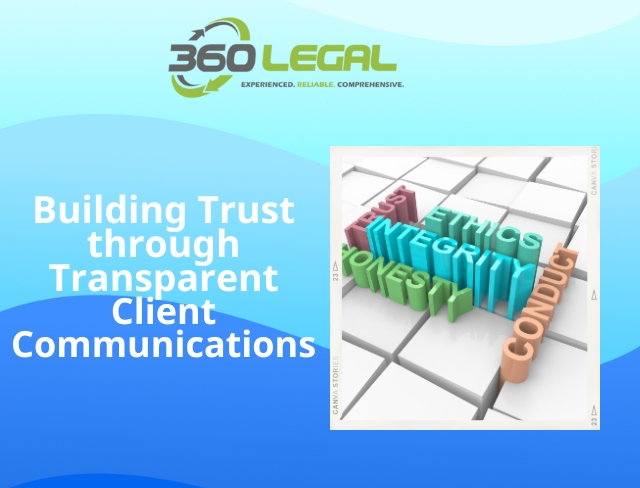Testing RSS Feeds.. ignore post.
Testing RSS Feeds.. ignore post.
Building Trust through Transparent Client Communications

In the realm of legal services, trust is the cornerstone of successful client relationships. Building and maintaining trust requires transparent communication throughout every interaction. This article explores the importance of transparent client communications in the context of a process serving company and provides actionable strategies for fostering trust.
Understanding Transparent Client Communications
Transparent client communications entail honesty, clarity, and consistency in all interactions between the service provider and the client. Unlike traditional approaches that may involve withholding information or using legal jargon, transparent communication focuses on openness and accessibility.
The Role of Trust in Client Relationships
Trust forms the foundation of client relationships in the legal domain. When clients trust their service provider, they are more likely to feel satisfied with the service, remain loyal, and refer others. Conversely, a lack of trust can lead to dissatisfaction and even legal disputes.
Strategies for Implementing Transparent Client Communications
Effective implementation of transparent client communications requires proactive measures. This includes maintaining open lines of communication, using clear and straightforward language, actively listening to client concerns, and addressing them promptly.
Case Studies:
The following is a DRAMATIZATION AND IS NOT AN ACTUAL EVENT: One example of successful implementation is the case of 360 Legal Services. By adopting transparent client communications, they were able to keep their clients informed about the progress of their cases in real-time. This transparency not only improved client satisfaction but also led to an increase in referrals.
Overcoming Obstacles and Addressing Client Concerns
Despite the benefits, there may be obstacles to transparent client communications, such as confidentiality concerns or legal complexities. However, these obstacles can be overcome through clear policies, education, and proactive communication.
Measuring the Impact of Transparent Client Communications
Measuring the effectiveness of transparent client communications is crucial for ongoing improvement. Key performance indicators such as client satisfaction ratings, retention rates, and referral rates can provide insights into the impact of transparent communication practices.
Providing Timely Updates to Clients
Keeping clients informed about the progress of their cases is vital for building trust and confidence. Timely updates reassure clients that their matters are being handled with care and attention. Whether it’s notifying them about court dates, serving documents, or any developments in their case, timely communication demonstrates transparency and accountability.
Providing timely updates to clients is not only about conveying information promptly but also about leveraging technology and efficient communication channels to enhance the client experience. In today’s digital age, process serving companies can utilize various tools and platforms to streamline communication and keep clients informed every step of the way.
One effective way to provide timely updates is through the use of case management software. These systems allow process servers to track the status of each case in real-time and automatically generate notifications for clients. Whether it’s a change in court dates, successful document serving, or any other milestone in the case, clients can receive instant updates via email, SMS, or through a secure online portal.
Additionally, integrating client communication tools such as chat bots or client portals on the company website can facilitate quick and convenient interactions. Clients can easily inquire about the status of their case, ask questions, or request updates without the need for phone calls or emails. This not only improves efficiency but also enhances transparency as clients have access to information whenever they need it.
Furthermore, embracing transparency in communication means being upfront about potential delays or challenges in the process. If there are unexpected hurdles or changes in the legal proceedings, clients should be informed promptly. Honesty about setbacks, accompanied by proactive solutions and reassurance, strengthens trust and demonstrates the company’s commitment to the client’s best interests.
By combining technology with a commitment to transparency, process serving companies can build strong client relationships based on trust and reliability. Timely updates, facilitated by digital solutions, ensure that clients are always informed and empowered throughout their legal journey.
Conclusion
Transparent client communications are essential for building trust and fostering strong client relationships in the legal services industry. By prioritizing honesty, clarity, and consistency in all interactions, process serving companies can establish themselves as trusted partners in their clients’ legal journeys.
FAQs
1. What are transparent client communications?
Transparent client communications involve honesty, clarity, and consistency in all interactions between the service provider and the client.
2. Why is trust important in client relationships?
Trust forms the foundation of client relationships and contributes to client satisfaction, loyalty, and referrals.
3. How can companies measure the impact of transparent client communications?
Key performance indicators such as client satisfaction ratings, retention rates, and referral rates can provide insights into the impact of transparent communication practices.
Conclusion
Empower your legal journey with transparent client communications. At 360 Legal, we prioritize honesty, clarity, and consistency to build trust with our clients. Let us be your trusted partner in navigating the legal landscape. Contact us today to learn more about how we can assist you in your legal matters.
Contact 360 Legal now at (888) 360-5345 to experience the benefits of transparent client communications firsthand. Schedule a consultation today!
Author
We are Social!
Latest tweets
Popular Tags
Testimonials
"5 star service ! prompt serving, helpful, professional . "
"Mike is awesome. Our firm has hired him on several occasions and we are very happy with his work. His prompt serving, helpful, professional and always in communication. I recommend him highly! "
"360Legal provides speedy and easy to use Process Service that is flexible, and very transparent with nearly instant reporting. It is very helpful for us to be able to track the status of our process service jobs, especially when they are time sensitive. "
Latest News
-

RMAI 2021 Annual Conference RMAI Annual Conference
April 12-15, 2021 -

NATIONAL CREDITORS BAR ASSOCIATION 2020 SPRING CONFERENCE
May 19-21, 2021 -

ALFN ANSWERS 2021
Jul 18-21, 2021 -

Annual Convention and Expo
Oct. 17-21, 2021 -

Florida Association of Professional Process Servers 33rd Quarter Board Meeting/Professional Beach Getaway
Aug. 20-22, 2021












